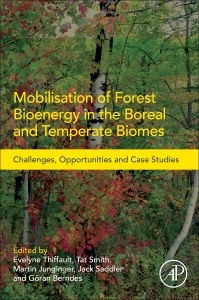Mobilisation of Forest Bioenergy in the Boreal and Temperate Biomes Challenges, Opportunities and Case Studies
Coordonnateurs : Thiffault Evelyne, Smith C.T., Junginger Martin, Berndes Göran

Mobilisation of Forest Bioenergy in the Boreal and Temperate Biomes: Challenges, Opportunities, and Case Studies features input from key international experts who identify and analyze the main opportunities and roadblocks for the implementation of sustainable forest biomass supply chains in the boreal and temperate regions. It draws from responses to surveys that were sent to specialists from different countries, compares models of bioenergy deployment, and discusses different types of bioenergy carriers.
Efficiency and profitability of the supply chain are analyzed and the scale and level of confidence of feedstock inventory estimates are highlighted. Logistics and ecological and socio-economic footprints are also covered. This book provides a synthesis of the scientific and technical literature on specific aspects of forest biomass supply chains, and quantifies future potentials in comparison to estimates provided by other sources and the targets for bioenergy production set by various organizations (IEA, IPCC, etc.).
Finally, the book proposes recommendations for practitioners, policymakers, and future research. This approach makes the book especially relevant for professionals, policymakers, researchers, and graduate students in the field of bioenergy conversion and management, as well as those interested in sustainable management of natural resources.
1. Introduction. Background, theoretical framework.
2. Models of forest biomass supply chains in various countries
3. Challenges and opportunities of logistics and economics of forest biomass mobilisation.
4. Social and economics aspects of forest biomass mobilisation.
5. Environmental sustainability aspects of forest biomass mobilisation, including soil, biodiversity, water and carbon balance.
6. Challenges and opportunities for the conversion technologies used to make forest biomass based bioenergy/biofuels
7. Challenges and opportunities of international trade of forest biomass
8. Forest bioenergy deployment in the absence of bioenergy policies/targets, with examples from Canada and Australia.
9. Quantifying forest biomass potential for mobilisation in the face of challenges and opportunities in the boreal and temperate biomes.
10. Conclusion: Synthesis and classification of main barriers and opportunities to mobilisation; comparisons and expectations of mobilisation of forest biomass in other biomes; recommendations.
Dr C.T. (Tat) Smith is a Professor at the faculty of geography and is Dean emeritus of the faculty of forestry of the University of Toronto (Canada). Professor Smith obtained a B.A. in economics from the University of Virginia, an M.A. in forestry from the University of Vermont, and a Ph.D. in forest resources from the University of Maine. He has experience with the environmental impact analysis associated with bioenergy production systems in North America, Europe and New Zealand. He is co-leader of IEA-Bioenergy Task 43, He has been a collaborator with IEA Bioenergy programs since 1985. He is currently the coordinator of the IEA-Bioenergy Intertask project : Mobilisation of biomass supply chains.
Dr. Martin Junginger is associate professor at Energy & Resources (E&R) of the Copernicus Institute, Utrecht University, and leads the bioenergy cluster of the E&R group. He has a background in chemistry and environmental science, and joined the staff of E&R in 2001 as PhD student, doing extensive research on the technological development and associated cost reductions of several renewable energy technologies, including onshore and offshore wind farms, biomass CHP p
- Presents foundational theory, examples and lessons learned, drawing on scientific and technical literature, as well as surveys conducted among stakeholders from various countries of the boreal and temperate biomes
- Provides best practices, insights, and recommendations through an integrative framework that encompasses various aspects of forest biomass supply chain, at different scales, and looking at a broad geographical and geopolitical range
- Compares contrasting history, policy context, and level of forest bioenergy development in several countries through several case studies
- Analyzes the efficiency and profitability of the supply chain, highlighting the scale and level of confidence of feedstock inventory estimates
Date de parution : 05-2016
Ouvrage de 266 p.
15x22.8 cm
Thèmes de Mobilisation of Forest Bioenergy in the Boreal and... :
Mots-clés :
availability; biochemical conversion; biodiversity; carbon balance; certification; conversion efficiency; densification; economic opportunities; economic sustainability; ecosystem services; employment; energy sector; entrepreneurs; feedstock quality management; forest bioenergy; forest biomass; forest biomass potential; forest management; forestry by-products; fossil fuels; GDP; governance; government support; integrated planning; intensification; international trade; land-use planning; lessons learnt; levellised cost of energy; long-rotation forestry; macroeconomic indicators; management of biomass quality; modern bioenergy; net primary production; organisation; organisation structures; productivity; renewable energy; renewable energy drivers; shared vision; silvicultural practices; social acceptance; standards; supply and demand; supply chain; supply chain data reporting; sustainability; technological and institutional learning; technological learning; technology transfer; temperate and boreal biomes; thermochemical conversion; trade; wood pellets



